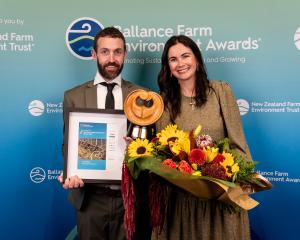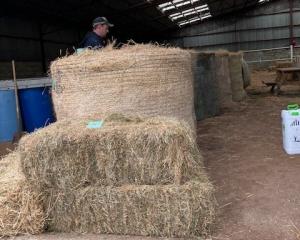
About 70 people attended an oat industry field day on Graeme and Elspeth Gardyne’s farm Viewbrae in Chatton, about 20km north of Gore on February 2.
Plant Research New Zealand managing director and principal plant breeder Adrian Russell, of Christchurch, said a global trend was crops being hammered more often by adverse weather for the past three years.
"Mostly heat and cold at the wrong time ... we’ve got to read those signals and start to find strategies to get around that."
Strategies to combat the heat were planting crops earlier or spreading crops between autumn and spring.
"So if one gets taken out, the other is hopefully OK."

Another strategy was breeding crops for early maturity so they were "in and out as quickly as possible and safely in a silo".
Some pests and diseases of crops, which had never posed a risk before were now becoming more prevalent and problematic.
The search was on for new genetics to provide resistance.
Globally, especially in Europe and the United Kingdom, pesticides were being withdrawn, removing tools for farmers to protect crops against pests and viruses.
New genetics were needed for crops to cope, he said.

He believed gene editing technology should be allowed in New Zealand to help farmers grow reliable crops.
"That’s a debate that will be ongoing for a long time."
He hoped some of the trial crops grown in Chatton would soon "tick enough boxes" to be available to farmers to grow.
"To get to this point we’ve looked at hundreds of thousands of plants and thousands of plot trials over many years."
Oat growers were "vulnerable" by growing just the L5 variety.

However, the hot and dry conditions had been a good test for the trial crops and provided data on their resilience.
Mr Russell thanked the Gardyne family "for giving so much to the group".
Mr Gardyne, the New Zealand Oat Industry Group chairman, said three combine harvesters and crews harvested hundreds of individual trial plots for testing including Plant Research New Zealand in Canterbury and its suitability for milling at Harraway & Sons in Dunedin.
The research was a joint effort, Mr Gardyne said.
"We are all in this game together."

Production costs were increasing such as packaging costs rising 20%.
Rising fuel costs was a "pain point", especially the cost of diesel to get product across Cook Strait.
The cost for the same amount of contracted grain cost $1.6 million more than it did last year, he said.
To recoup some of the expense it had increased its prices in supermarkets in the past year.
If the prices had been increased enough was a "delicate topic".

Exciting times lay ahead for the oat industry, he said.
"There’s a lot to look forward to."
He concluded his speech thanking the Gardyne family and Plant Research New Zealand for their contribution to the oat breeding programme.
"We thank you for your time and energy."















